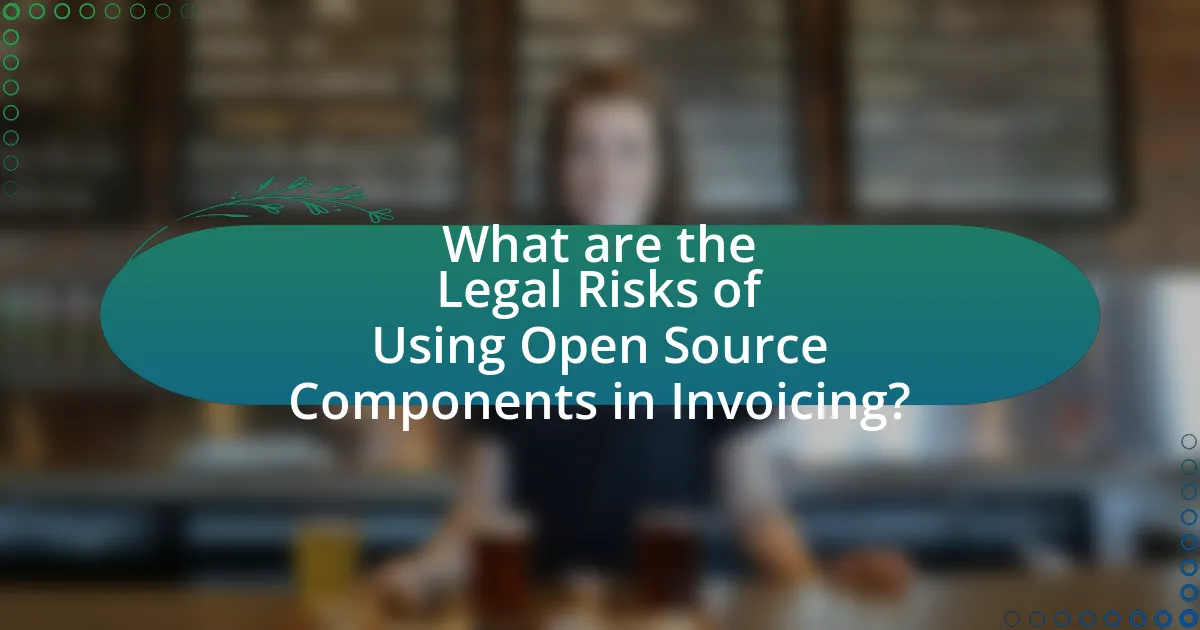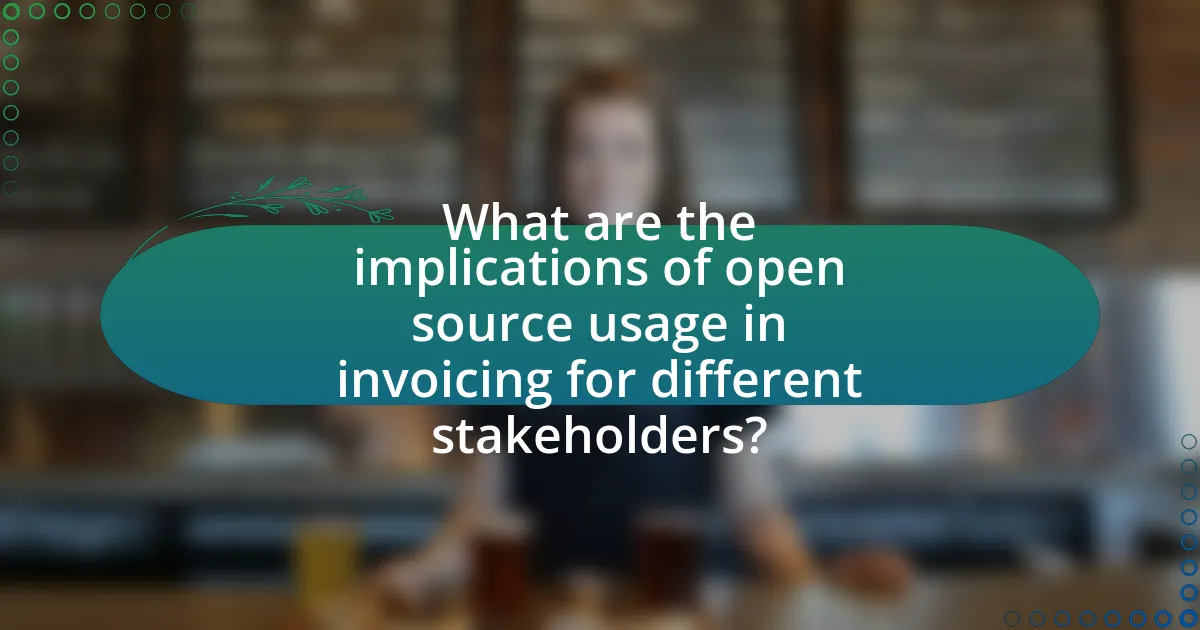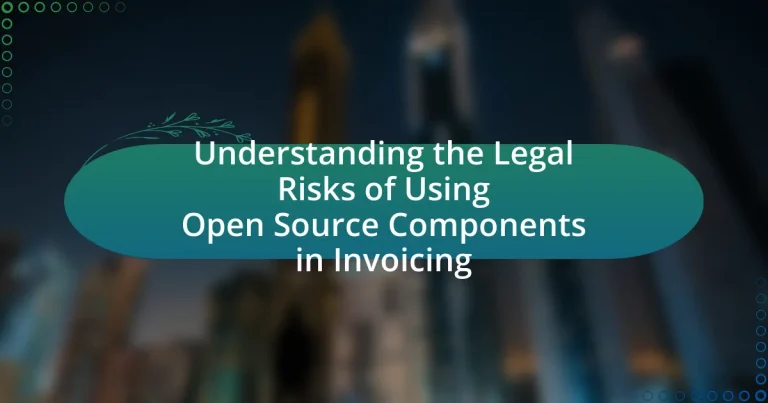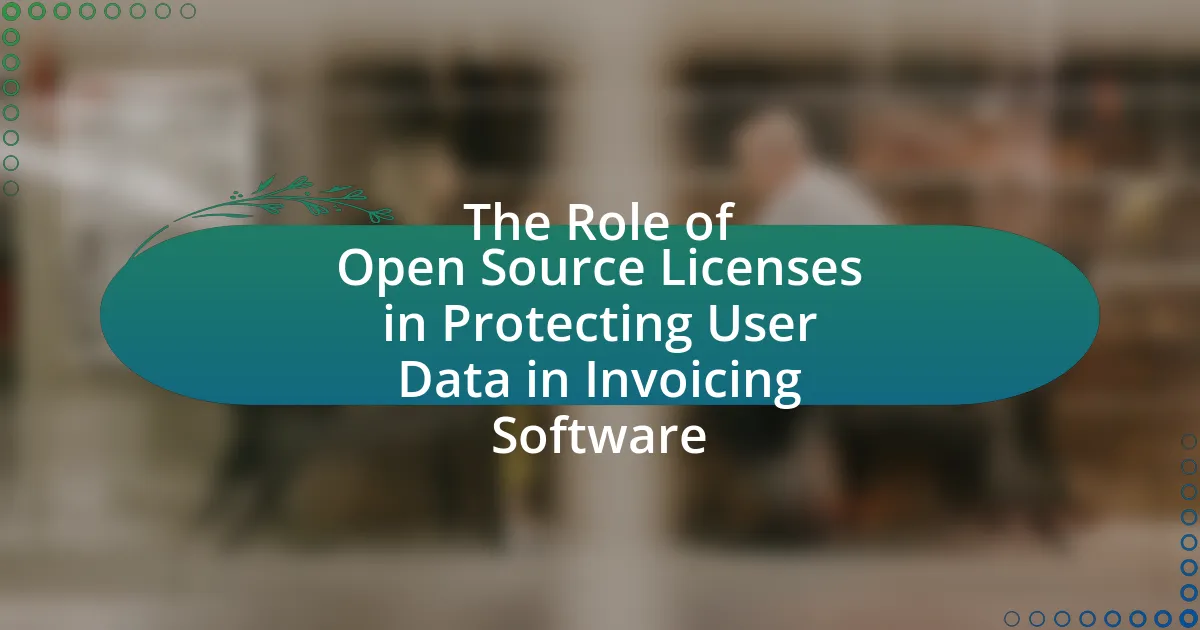The article focuses on the legal risks associated with using open source components in invoicing systems. It outlines potential issues such as copyright infringement, licensing violations, and liability for security vulnerabilities, emphasizing the importance of understanding open source licenses to avoid legal liabilities. Key topics include the differences between permissive and copyleft licenses, the implications of non-compliance, and best practices for mitigating legal risks through thorough license reviews, documentation, and regular audits. The article also highlights the impact of these legal considerations on businesses, developers, and customers, underscoring the necessity for effective collaboration between legal and development teams to ensure compliance.

What are the Legal Risks of Using Open Source Components in Invoicing?
The legal risks of using open source components in invoicing include potential copyright infringement, licensing violations, and liability for security vulnerabilities. Copyright infringement can occur if a company fails to comply with the terms of the open source license, which may require attribution or restrict commercial use. Licensing violations can lead to legal action from the original authors, especially if the software is redistributed without adhering to the license terms. Additionally, if an open source component contains security vulnerabilities, the company may face liability for any resulting data breaches or financial losses, as seen in cases like the Equifax breach, where outdated open source components contributed to significant legal and financial repercussions.
Why is it important to understand legal risks in open source software?
Understanding legal risks in open source software is crucial because it helps organizations avoid potential legal liabilities and compliance issues. Open source licenses often contain specific obligations that, if not adhered to, can lead to lawsuits or the loss of software rights. For instance, the GNU General Public License requires that any derivative work also be open source, which can impact a company’s proprietary software strategy. Additionally, a 2020 study by the Linux Foundation found that 70% of organizations experienced legal issues related to open source compliance, highlighting the importance of understanding these risks to protect intellectual property and ensure regulatory compliance.
What are the common legal issues associated with open source components?
Common legal issues associated with open source components include licensing compliance, intellectual property infringement, and warranty disclaimers. Licensing compliance is critical as failure to adhere to the terms of open source licenses can lead to legal disputes; for example, the GNU General Public License requires that derivative works also be open source. Intellectual property infringement may occur if proprietary code is inadvertently included in open source projects, risking legal action from original copyright holders. Additionally, many open source licenses include warranty disclaimers, which means users cannot hold developers liable for defects or issues, potentially leading to financial risks if the software fails. These issues highlight the importance of thorough legal review and risk assessment when integrating open source components into invoicing systems.
How can legal risks impact invoicing processes?
Legal risks can significantly impact invoicing processes by introducing potential liabilities and compliance issues. For instance, using open source components without proper licensing can lead to copyright infringement claims, which may result in financial penalties and legal disputes. Additionally, failure to adhere to regulatory requirements, such as data protection laws, can complicate invoicing practices and expose businesses to lawsuits. These legal challenges can disrupt cash flow, increase operational costs, and damage a company’s reputation, ultimately affecting its financial stability and relationships with clients.
What types of licenses govern open source components?
Open source components are governed by various types of licenses, primarily categorized into permissive and copyleft licenses. Permissive licenses, such as the MIT License and the Apache License 2.0, allow users to modify, distribute, and use the software with minimal restrictions. In contrast, copyleft licenses, like the GNU General Public License (GPL), require that any derivative works also be distributed under the same license terms, ensuring that the software remains open source. The distinction between these license types is crucial for understanding the legal implications of using open source components in software development, particularly in invoicing systems, where compliance with license terms is essential to avoid legal risks.
What are the differences between permissive and copyleft licenses?
Permissive licenses allow users to modify, distribute, and use software with minimal restrictions, often permitting proprietary use without requiring derivative works to be open source. In contrast, copyleft licenses require that any derivative works be distributed under the same license terms, ensuring that modifications remain open source. For example, the MIT License is a permissive license, while the GNU General Public License (GPL) is a copyleft license. This fundamental difference impacts how software can be used in commercial applications, particularly in invoicing systems, where compliance with licensing terms is crucial to avoid legal risks.
How do specific licenses affect the use of open source in invoicing?
Specific licenses significantly influence the use of open source in invoicing by dictating how the software can be modified, distributed, and integrated into proprietary systems. For instance, licenses like the GNU General Public License (GPL) require that any derivative work also be open source, which can limit a company’s ability to keep its invoicing software proprietary. In contrast, permissive licenses such as the MIT License allow for more flexibility, enabling companies to use, modify, and incorporate the software into proprietary applications without the obligation to disclose their own source code. This distinction is crucial for businesses to understand, as it directly impacts their legal obligations and potential risks associated with using open source components in invoicing systems.
What are the potential consequences of non-compliance with open source licenses?
Non-compliance with open source licenses can lead to legal consequences, including lawsuits, financial penalties, and the requirement to cease using the software. Organizations that fail to adhere to the terms of open source licenses risk facing litigation from copyright holders, which can result in costly legal fees and damages. For instance, in 2018, a prominent case involved a company being sued for not complying with the GNU General Public License, highlighting the serious repercussions of ignoring licensing agreements. Additionally, non-compliance may damage a company’s reputation and lead to loss of trust among customers and partners, further impacting business operations.
What legal actions can be taken against companies for license violations?
Companies can face several legal actions for license violations, including civil lawsuits, monetary damages, injunctions, and potential criminal charges. Civil lawsuits can be initiated by the license holder, seeking damages for unauthorized use or distribution of licensed materials. Monetary damages may include statutory damages, which can range from hundreds to thousands of dollars per violation, depending on the jurisdiction and specific license terms. Injunctions can be sought to prevent further use of the licensed material, effectively halting any ongoing infringement. In severe cases, criminal charges may be pursued, particularly if the violation is deemed willful or involves significant financial harm. These legal actions are supported by various copyright and intellectual property laws, which provide a framework for protecting licensed materials and enforcing compliance.
How can non-compliance affect a company’s reputation and finances?
Non-compliance can severely damage a company’s reputation and finances by leading to legal penalties, loss of customer trust, and decreased market competitiveness. Companies that fail to adhere to regulations may face fines that can reach millions of dollars, as seen in cases like the $5 billion fine imposed on Facebook for privacy violations. Additionally, negative publicity from non-compliance can result in a significant drop in customer loyalty; for instance, a study by PwC found that 59% of consumers would avoid a company after a data breach. This erosion of trust can lead to reduced sales and a decline in stock prices, further impacting financial stability.

How can businesses mitigate legal risks when using open source components?
Businesses can mitigate legal risks when using open source components by implementing a comprehensive compliance strategy that includes thorough license review, proper documentation, and regular audits. A thorough license review ensures that businesses understand the obligations and restrictions associated with each open source component, as different licenses (such as GPL, MIT, or Apache) impose varying requirements. Proper documentation of all open source components used in a project helps maintain transparency and accountability, while regular audits can identify any compliance issues early, allowing for timely remediation. According to a 2021 report by the Open Source Security Foundation, 70% of organizations that conduct regular audits report a significant reduction in legal risks associated with open source software.
What best practices should be followed when integrating open source software?
When integrating open source software, it is essential to follow best practices such as conducting thorough license compliance checks, ensuring proper documentation, and maintaining security protocols. License compliance checks involve reviewing the specific licenses of the open source components to ensure they align with your project’s legal requirements, as different licenses impose varying obligations. Proper documentation is crucial for tracking the use of open source components, which aids in audits and future maintenance. Additionally, maintaining security protocols, such as regularly updating components and monitoring for vulnerabilities, helps mitigate risks associated with using open source software. These practices are supported by industry standards and guidelines, such as the Open Source Initiative’s recommendations, which emphasize the importance of compliance and security in open source integration.
How can companies ensure compliance with open source licenses?
Companies can ensure compliance with open source licenses by implementing a robust open source policy that includes thorough inventory management of all open source components used in their software. This policy should mandate regular audits to verify compliance with license terms, such as attribution requirements and redistribution conditions. Additionally, companies should provide training for developers on the implications of open source licenses and establish a review process for any new open source software before it is integrated into their projects. According to the 2021 Open Source Security and Risk Analysis report by Synopsys, 79% of codebases contain open source components, highlighting the necessity for companies to actively manage and comply with these licenses to mitigate legal risks.
What role does documentation play in mitigating legal risks?
Documentation plays a critical role in mitigating legal risks by providing clear evidence of compliance with licensing requirements and usage terms of open source components. Proper documentation ensures that organizations can demonstrate adherence to legal obligations, which reduces the likelihood of disputes or litigation. For instance, maintaining records of licenses, modifications, and attributions can protect against claims of copyright infringement, as seen in cases where companies faced legal action due to inadequate documentation of open source software usage. Thus, comprehensive documentation serves as a safeguard, enabling organizations to navigate legal complexities effectively.
What tools and resources are available for managing open source compliance?
Tools and resources available for managing open source compliance include software composition analysis tools, license management platforms, and compliance checklists. Software composition analysis tools, such as Black Duck and Snyk, help organizations identify open source components and their associated licenses, ensuring compliance with legal requirements. License management platforms, like FOSSA and OpenChain, provide frameworks for tracking and managing open source licenses throughout the software development lifecycle. Compliance checklists, often provided by organizations like the Open Source Initiative, offer guidelines for assessing compliance risks and implementing best practices. These resources collectively support organizations in mitigating legal risks associated with open source components in invoicing and other applications.
How can software composition analysis tools help in risk management?
Software composition analysis tools help in risk management by identifying and assessing vulnerabilities in open source components used in software development. These tools scan codebases to detect known security issues, licensing compliance risks, and outdated dependencies, enabling organizations to mitigate potential legal and security threats. For instance, a report by the National Institute of Standards and Technology (NIST) highlights that 90% of software projects utilize open source components, which can introduce significant risks if not properly managed. By providing detailed insights into the components and their associated risks, software composition analysis tools empower organizations to make informed decisions, ensuring compliance with legal requirements and enhancing overall software security.
What resources can companies use to stay updated on open source licensing?
Companies can use several resources to stay updated on open source licensing, including the Open Source Initiative (OSI), which provides comprehensive information on licenses and compliance. Additionally, organizations can refer to the Software Freedom Law Center (SFLC) for legal guidance and updates on open source law. The Free Software Foundation (FSF) also offers resources and advocacy related to open source licensing. Furthermore, subscribing to newsletters from legal firms specializing in technology law can provide timely updates on changes in licensing regulations. Engaging with online communities and forums, such as GitHub discussions or Stack Overflow, can also facilitate knowledge sharing about open source licensing developments.

What are the implications of open source usage in invoicing for different stakeholders?
Open source usage in invoicing has significant implications for various stakeholders, including businesses, developers, and customers. For businesses, utilizing open source software can reduce costs and enhance flexibility, allowing for customization and integration with existing systems. However, it also introduces legal risks, such as compliance with licensing agreements, which can lead to potential liabilities if not adhered to. Developers benefit from the collaborative nature of open source, gaining access to a wealth of resources and community support, but they must also ensure that their contributions do not infringe on existing licenses. Customers may experience improved service and innovation due to the competitive nature of open source solutions, yet they face risks related to data security and software reliability, which can impact their trust in the invoicing process. Overall, while open source can drive efficiency and innovation in invoicing, stakeholders must navigate the associated legal complexities to mitigate risks.
How do developers and legal teams collaborate on open source compliance?
Developers and legal teams collaborate on open source compliance by establishing clear communication channels and defining roles in the compliance process. Developers are responsible for identifying and integrating open source components, while legal teams assess the licensing requirements and potential legal risks associated with those components. This collaboration often involves regular meetings to discuss compliance strategies, utilizing tools for tracking open source usage, and ensuring that all team members are aware of the legal implications of their work. For instance, a study by the Open Source Initiative highlights that organizations with integrated compliance processes experience fewer legal disputes related to open source software.
What challenges do developers face when using open source components?
Developers face several challenges when using open source components, primarily related to legal risks, compatibility issues, and maintenance concerns. Legal risks arise from the need to comply with various open source licenses, which can impose restrictions on usage, modification, and distribution. For instance, failure to adhere to the terms of the GNU General Public License can lead to legal repercussions. Compatibility issues may occur when integrating open source components with proprietary software, potentially leading to conflicts or functionality problems. Additionally, maintenance concerns include the reliance on community support for updates and bug fixes, which can be inconsistent and may leave developers vulnerable to security vulnerabilities if components are not actively maintained.
How can legal teams support developers in understanding licensing?
Legal teams can support developers in understanding licensing by providing clear guidelines and training on the various types of software licenses. This support includes creating accessible documentation that outlines the implications of different licenses, such as permissive versus copyleft licenses, and how they affect the use of open source components in invoicing systems. Additionally, legal teams can facilitate workshops or training sessions that focus on real-world scenarios, helping developers recognize potential legal risks associated with non-compliance. By ensuring that developers are well-informed about licensing requirements, legal teams can mitigate risks and promote adherence to legal standards in software development.
What should businesses consider when choosing open source components for invoicing?
Businesses should consider the licensing terms, security vulnerabilities, and community support when choosing open source components for invoicing. Licensing terms dictate how the software can be used, modified, and distributed, which is crucial for compliance and avoiding legal issues. Security vulnerabilities are important as open source components can be targets for attacks; businesses should assess the component’s history of vulnerabilities and the responsiveness of the community in addressing them. Community support is vital for ongoing maintenance and updates, as a strong community can provide timely fixes and enhancements, ensuring the component remains reliable and secure for invoicing purposes.
How can the choice of open source components affect invoicing efficiency?
The choice of open source components can significantly enhance invoicing efficiency by reducing development time and costs. Open source components often come with pre-built functionalities that can be integrated into invoicing systems, allowing businesses to implement solutions faster than developing from scratch. For instance, a study by the Open Source Initiative found that companies using open source software reported a 30% reduction in development time, which directly correlates to quicker invoicing processes. Additionally, the collaborative nature of open source communities can lead to continuous improvements and updates, ensuring that invoicing systems remain efficient and up-to-date with the latest features and security measures.
What factors should be evaluated to ensure legal safety in component selection?
To ensure legal safety in component selection, it is essential to evaluate licensing compliance, security vulnerabilities, and the reputation of the component’s maintainers. Licensing compliance involves understanding the specific terms and conditions of open source licenses, as failure to adhere can lead to legal repercussions. Security vulnerabilities must be assessed to prevent potential exploitation, as components with known issues can expose the system to risks. Additionally, the reputation of maintainers is crucial; components maintained by reputable organizations or individuals are more likely to receive timely updates and support, reducing legal and operational risks.
What practical steps can businesses take to avoid legal pitfalls with open source components?
Businesses can avoid legal pitfalls with open source components by implementing a robust compliance strategy that includes thorough license review, proper documentation, and employee training. Conducting a comprehensive license review ensures that businesses understand the terms and conditions associated with each open source component, which can vary significantly; for example, some licenses may require attribution or impose restrictions on redistribution. Proper documentation of all open source components used in projects helps maintain transparency and accountability, facilitating easier audits and compliance checks. Additionally, training employees on the implications of open source licenses and best practices for usage can significantly reduce the risk of unintentional violations. According to a 2021 report by the Open Source Security Foundation, 70% of organizations that implemented such compliance measures reported a decrease in legal issues related to open source software.
How can regular audits help in maintaining compliance?
Regular audits help maintain compliance by systematically evaluating adherence to legal and regulatory standards. These audits identify potential risks associated with the use of open source components in invoicing, ensuring that organizations comply with licensing agreements and avoid legal repercussions. For instance, a study by the Open Source Initiative found that 60% of organizations using open source software faced compliance issues due to lack of proper audits. By conducting regular audits, companies can proactively address these issues, implement corrective actions, and foster a culture of compliance, ultimately reducing the risk of legal challenges.
What training should be provided to employees regarding open source usage?
Employees should receive training on the legal implications and compliance requirements associated with open source software usage. This training should cover topics such as understanding open source licenses, the differences between permissive and copyleft licenses, and the potential legal risks of non-compliance, including litigation and financial penalties. Additionally, employees should be educated on best practices for evaluating and selecting open source components, ensuring that they align with the organization’s policies and legal obligations. This approach is supported by the fact that organizations face increased scrutiny regarding software compliance, as highlighted in the 2021 Open Source Security and Risk Analysis report, which found that 70% of codebases contained open source components with known vulnerabilities.




